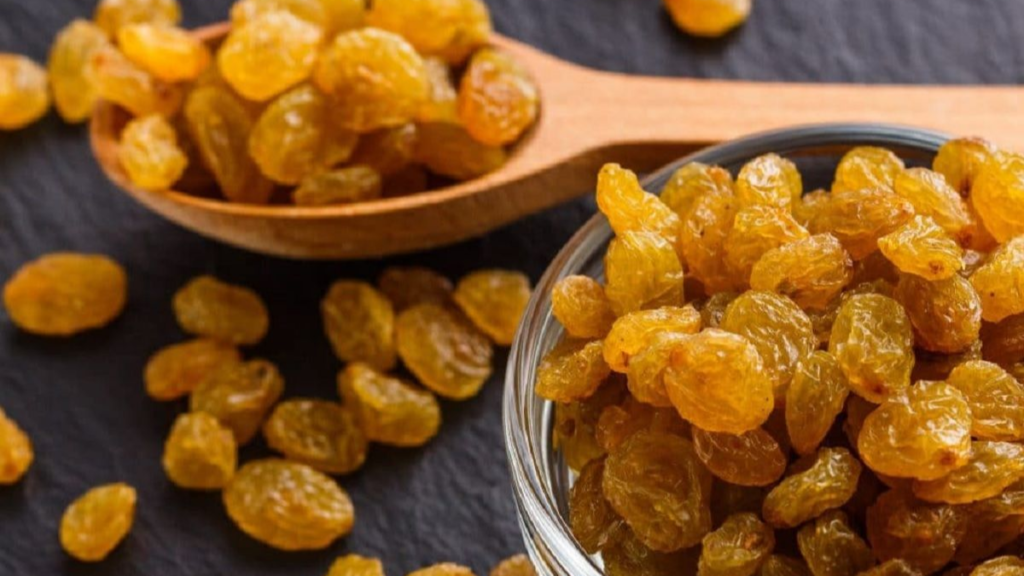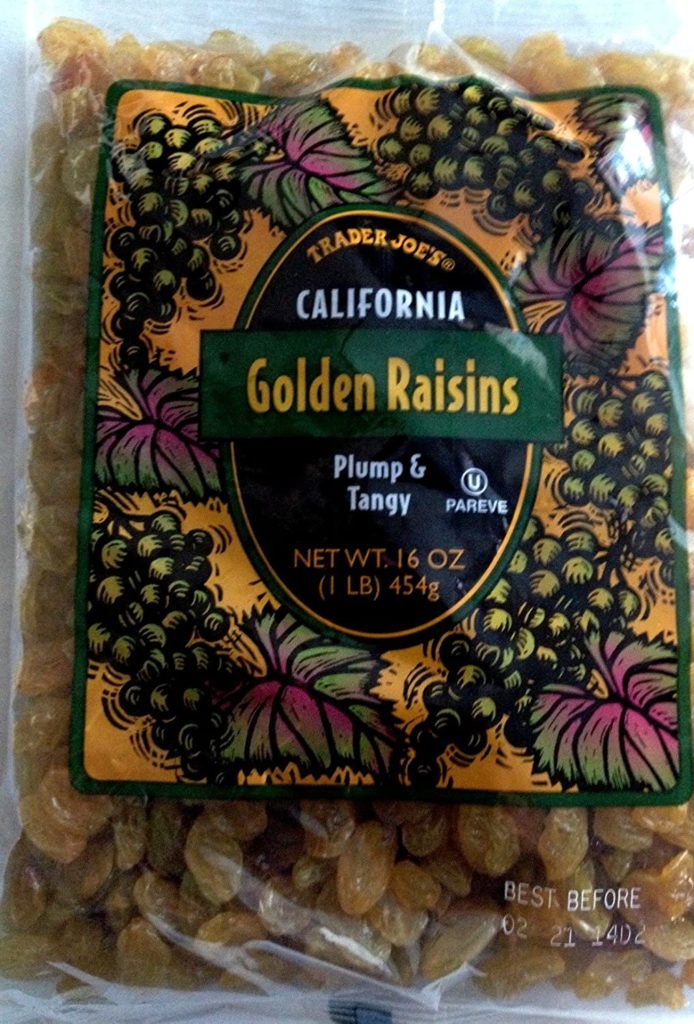Raisins are essentially dried grapes. Because the nutrients and sugars in grapes are concentrated throughout the drying process, raisins are nutrition and calorie-dense. Raisins were first discovered in the Middle East and then brought to Europe, particularly popular among the Greeks and Romans. Raisins were once utilized as payment, as prizes in sporting events, and to heal illnesses such as food poisoning.
They are now widely available in supermarkets and appear in various hues, depending on the drying procedure employed. Raisins are nutrient-dense, minimally processed food with no artificial chemicals or preservatives. However, because they’re high in sugar and calories, they should only be consumed in moderation. Red and brown raisins are famous for snacking, whereas golden yellow raisins are widely used in baked dishes.
Raisins Nutrition Facts
Here’s a table for Raisins Nutrition Facts based on a serving size of 100 grams. Percent daily values are based on a 2,000-calorie diet:
| Nutrient | Amount per serving | % Daily Value |
| Calories | 299 kcal | 15% |
| Protein | 3.1 g | 6% |
| Fat | 0.5 g | 1% |
| Carbohydrates | 79.2 g | 26% |
| Fiber | 3.7 g | 15% |
| Sugar | 59.2 g | – |
| Sodium | 11 mg | 0.5% |
| Potassium | 749 mg | 21% |
| Calcium | 50 mg | 5% |
| Iron | 1.9 mg | 11% |
| Magnesium | 32 mg | 8% |
| Vitamin C | 3.0 mg | 3% |
Note: The nutrient content of raisins can vary slightly depending on the specific variety and processing methods.
Raisins Health Benefits
Raisins are a healthy snack option that provides a variety of nutrients. On the other hand, Raisins are dried fruit and lack the water content of ordinary grapes, and they’re less satisfying than whole fruit and simple to overeat. To prevent adding too many calories to your diet, eat in small quantities. Adding a handful to your cereal or snack may provide various health benefits, including:
To Gain Weight, Eat Raisins
Not everyone is trying to slim down. Some folks want to gain weight healthily. And raisins can help you do it comprehensively. Raisins can be your best pals if you’re trying to gain weight. Raisins are high in fructose and glucose, providing plenty of energy. They’ll help you acquire weight without raising your bad cholesterol,” says the author.
It May also Assist in Cancer Prevention.
The presence of catechins in raisins has anticarcinogenic effects. “Catechins contain polyphenol chemicals that have antioxidant properties,” she explains.
It Aids in the Control of Your Blood Pressure
Blood pressure changes can be caused by stress and our food habits. This is not a promising sign. But, thank goodness, raisins have a solution. It contains a lot of potassium, a natural vasodilator that relaxes our blood vessels improves blood circulation, and relieves hypertension. Raisins’ dietary fiber also helps reduce blood vessel stiffness, lowering blood pressure and the risk of hypertension.
Raisins also Help to Boost Immunity.
Immunity has become increasingly important in everyone’s life due to covid-19. Raisins include critical nutrients such as vitamins and minerals and additional substances, including antioxidants and polyphenols. These aid in the fight against free radicals in our system, stabilizing them and keeping them from causing oxidative damage to our cells, particularly the white blood cells that make up our immune system‘s backbone. “Raisins also have antibacterial, antiviral, and antifungal qualities that minimize the risk of various infections,” says one researcher chevalier.
Aids in the Treatment of Anti-Inflammatory Diseases such as Arthritis
Raisins can assist in relieving pain caused by inflammatory conditions, including Arthritis and gout. This is because antioxidants and polyphenols are present. Antioxidants like vitamin C and polyphenols are anti-inflammatory, which lowers the pain and inflammation linked with gout and Arthritis,” she explains.
It will Assist You in Sleeping Better.
Lack of restful sleep can harm your mental and physical health. And what could be better than a tasty treat to help you sleep better? Because raisins include an essential component like iron, they effectively treat insomnia. As we all know, iron is a crucial mineral that boosts hemoglobin formation and enhances metabolism, oxygen transport, Immunity, and sleep quality.
Fiber
A half-cup of raisins provides 3.3 grams of fiber, or 10 to 24 percent of your daily fiber requirements, depending on your age and gender. Fibre aids digestion by softening and expanding the size and weight of your feces. Bulkier stools are easier to pass and can aid in preventing constipation. Because fiber delays the emptying of your stomach, it keeps you fuller for longer. Fibrous foods may help you lose weight if you’re trying to lose weight. Fiber affects cholesterol levels, and dietary fiber lowers the “bad” cholesterol known as low-density lipoprotein (LDL).
Iron
Raisins contain a lot of iron. 1.3 milligrams of iron are found in half a cup of raisins. For most adult females, that’s around 7% of the daily recommended intake, while it’s roughly 16% for adult men. Iron is necessary for forming red blood cells and their function in transporting oxygen to your body’s cells. To avoid iron deficiency anemia, you must consume adequate iron.
Boron and Calcium
A 1/2 cup serving of raisins contains roughly 45 milligrams of calcium. This amounts to around 4% of your daily requirements. Calcium is necessary for strong and healthy bones and teeth. If you’re a postmenopausal woman, raisins are a fantastic snack since calcium helps prevent osteoporosis, a disease marked by bone loss typically occurring as you age. Raisins also have a high concentration of the trace element boron. Together with vitamin D and calcium, Boron helps maintain the health of your bones and joints. It also aids in the treatment of osteoporosis.
How Many Raisins Should We Eat in a Day?
The daily intake of raisins should not exceed 40 to 50 grams. According to Jagriti Brar, eating too many raisins can affect our digestive system. Raisins are high in fiber and can help with digestion, but too much fiber can hurt the system and inhibit the absorption of other nutrients. Because raisins are high in iron, they aid in treating anemia by supplying you with the daily necessary iron intake. Iron deficiency can be avoided by including raisins in your daily diet. These dried grapes are naturally delicious and low in calories.
The order in which soaked raisins are consumed is critical. As a result, the optimum time to finish them is on an empty stomach first thing in the morning. “You can soak the raisins overnight, say for 5-6 hours,” advises the dietician.3.3 grams of fiber per half-cup of raisins, or 10 to 24 percent of your daily fiber needs, depending on your age and gender. Fibre aids digestion by softening and expanding the size and weight of your feces. Bulkier stools are easier to pass and can help in preventing constipation.
Is it Safe to Consume Raisins Regularly?
Iron deficiency can be avoided by including raisins in your daily diet. These dried grapes are naturally delicious and low in calories, and they’re also high in fiber, so a modest amount will keep you feeling full for longer. Eating raisins regularly may help maintain the body healthy and prevent certain diseases. However, raisins should be consumed in moderation because they are high in sugars and calories, which may be a point for persons attempting to lose weight. Dietary fibers can help alleviate diarrhea by absorbing excess fluid from our bodies.
However, consuming too many of them without drinking enough water can lead to dehydration, indigestion, and other gastrointestinal problems. The daily intake of raisins should not exceed 40 to 50 grams. According to Jagriti Brar, eating too many raisins can affect our digestive system. Raisins are high in fiber and can help with digestion, but too much fiber can hurt the system and inhibit the absorption of other nutrients.
Are Raisins Good for Skin?
A few raisins a day can help you achieve clear, healthy, and youthful skin. Raisins are high in antioxidants, which aid in skin rejuvenation. Raisins are high in antioxidants, which help to revitalize and protect the skin from damage and sagging. It’s an excellent component for treating fine lines and wrinkles since it reduces skin damage and sagging. It also purifies the blood, resulting in acne clearing. Raisins. This little dried fruit is packed with skin benefits and is readily available. A daily serving of raisins will help you achieve youthful, radiant, clear, and healthy skin.
Although these fruits are abundant in fiber, they all rank high on the glycemic index, which ranks foods based on how rapidly they convert to sugar in the body. Several studies suggest foods with a high GI score may aggravate acne. Give your body the nourishment to clear up acne from the inside out. Black raisins are one such product that can assist you in your endeavor. This tiny, easily accessible, inexpensive dry fruit provides numerous skin advantages.
Is it Ok to Eat Raisins on an Empty Stomach?
While eating raisins uncooked raisins are customary, soaking them in water overnight and eating them first thing in the morning on an empty stomach is considered particularly healthful. Early in the morning, soaked raisins might help maintain the digestive tract healthily. Because raisins are substantial in fiber, they assist in keeping bowel movements regular and bloating at bay. Studies have shown Raisins to lessen the risk of heart disease by lowering blood pressure and blood sugar levels.
Raisins’ fiber helps lower LDL (bad) cholesterol, relieving stress on your heart. Raisins are high in potassium as well. Compared to eating the raisins uncooked, soaking them and eating them every day is a healthier option. The vitamins and minerals on the raisin’s outer skin dissolve in the water. As a result, the number of nutrients absorbed by the body increases.
Do Raisins Raise Blood Pressure?
According to Dr. Bays, raisins are high in potassium, which is known to help decrease blood pressure. “They’re also high in antioxidant dietary fiber, which may help change the biochemistry of blood vessels, making them less rigid and lowering blood pressure.”
If you have high blood pressure, consume enough potassium-rich fruits and vegetables. Potassium-rich fruits include bananas, oranges, and dried fruits like raisins, apricots, prunes, and dates. Peas, greens, tomatoes, spinach, and potatoes are some options for vegetables.
The increase in soluble fiber caused by eating too many raisins is another problem.
Constipation, gas, and bloating may occur if you consume too much fiber, and some folks may also experience diarrhea. But it has far more health benefits than just pleasing your sweet desire. Black raisins are a great addition to your diet, preventing hair loss, removing pollutants from blood, lowering blood pressure, and preventing anemia. They contain natural antioxidants and are high in iron.
Conclusion
Raisins are a delicious addition to almost any sweet spread. Raisins can be eaten straight from the package or added to several meals. There are endless alternatives, from breakfasts to desserts to savory feasts. Some suggestions for including more raisins in your diet: Try this flourless version of famous oatmeal raisin cookies for a healthier alternative. Look over the recipe. Make this cinnamon raisin cashew butter if you want to try something new. You can use another nut instead of cashews if you choose. Look over the recipe. Raisins and juicy apples add flavor to chicken salad.
Look over the recipe. Granola is simple to produce at home, contrary to popular opinion. Raisins are a fantastic addition to any granola recipe. This cinnamon raisin granola recipe can easily be prepared gluten-free or vegan. Look over the recipe. Muffins with pumpkin, raisins, and flaxseed are high in fiber. Look over the recipe. Adding raisins to your pasta might seem weird. The Mayo Clinic’s experts created this spaghetti meal using spinach, garbanzo beans, and raisins. It contains a lot of iron, protein, and fiber.



